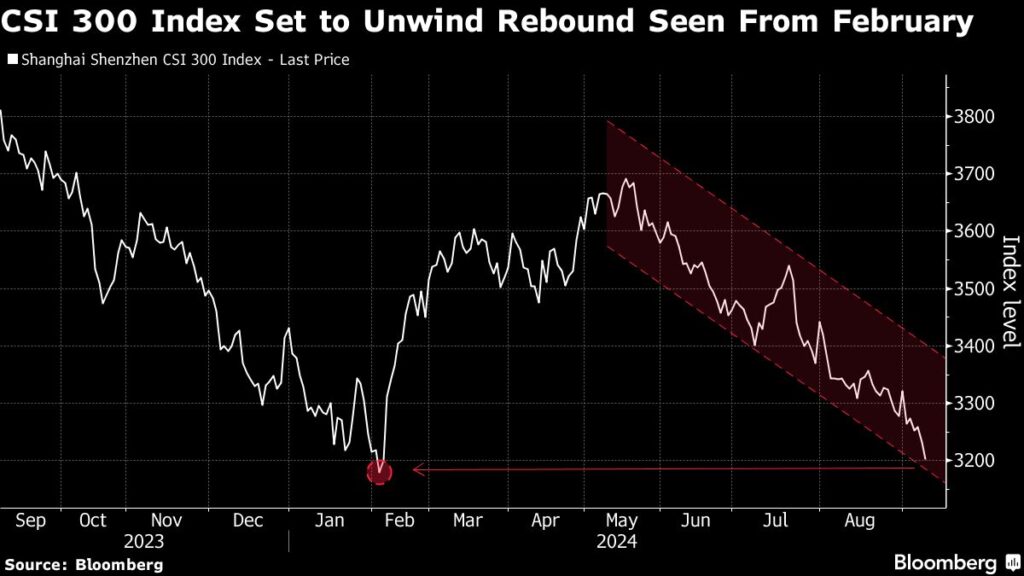(Bloomberg) — Chinese stocks are on the brink of falling to a five-year low seen in February as bearish sentiment grips the market amid a lack of earnings and economic recovery.
Most Read from Bloomberg
The CSI 300 Index declined as much as 1.2% on Monday, taking its slide from this year’s high in May to more than 13%. A further decline would take the benchmark to levels unseen since early 2019, suggesting years of policy efforts to revive the economy and prop up share prices have proved futile.
The market has been stuck in a cycle where stocks would plumb new lows after a brief rebound triggered by short-lived optimism. The government’s piecemeal approach to stimulus has failed to fix a crisis of confidence, with deflationary pressure, anemic consumption and an extended property slump combining to erode hopes of a near-term economic recovery.
“There are some big structural headwinds coupled with deteriorating short-term dynamics which have hurt investors,” said Matthew Haupt, a portfolio manager at Wilson Asset Management. The government needs to get “some confidence back in the direction of the economy,” he added.
The CSI 300 Index rebounded 16% from February through mid-May, as state funds purchased billions of dollars worth of exchange-traded funds and regulators clamped down on short sales and quant trades. Its slide since then is just another example of how policies have failed to address the fundamental ailments that have been hurting sentiment.
Even long-time China bulls UBS Global Wealth Management, Nomura Holdings Inc., and JPMorgan Chase & Co. have downgraded the country’s equities in recent weeks, citing concerns ranging from a drop in property-led demand to underwhelming stimulus measures and geopolitical tensions ahead of the US elections.
The equities slump has coincided with a growing consensus among the world’s largest banks that the country would miss its around 5% growth target this year. In the latest blow to sentiment, China’s consumer prices rose less than expected last month, adding to signs policymakers are struggling to get households spending.
To be sure, some investors say Chinese equities’ ultra-cheap valuations offer good risk-reward opportunity. The MSCI China Index is trading at less than nine times forward price-to-earnings, compared to a ratio of 24 for its emerging market rival India.
The CSI 300 is near levels seen during the February rout, when exit orders at structured products like snowball derivatives and quantitative funds exacerbated a selloff, and investors rotated into Indian stocks in a major shift in EM portfolios.
While there are some stock-specific opportunities, “even the long-term Chinese champions are not immune to the persistently weak China economic backdrop with limited visibility of improvement,” said Vivian Lin Thurston, a portfolio manager for William Blair Investment Management in Chicago. “Domestic policy trends and geopolitical risks may continue to pressure the multiples of Chinese equities structurally.”
Earnings per share for the MSCI China Index fell 4.5% from the year earlier in the second quarter, its worst in five quarters, according to data from Bloomberg Intelligence. Underscoring the contraction was weakening support from the country’s eight biggest tech firms.
Down nearly 7% this year, the benchmark CSI 300 Index ranks among the world’s worst-performing major gauges and is headed for a record fourth year of losses.
(Updates with new comment from William Blair in third paragraph from bottom.)
Most Read from Bloomberg Businessweek
©2024 Bloomberg L.P.
Read the full article here

